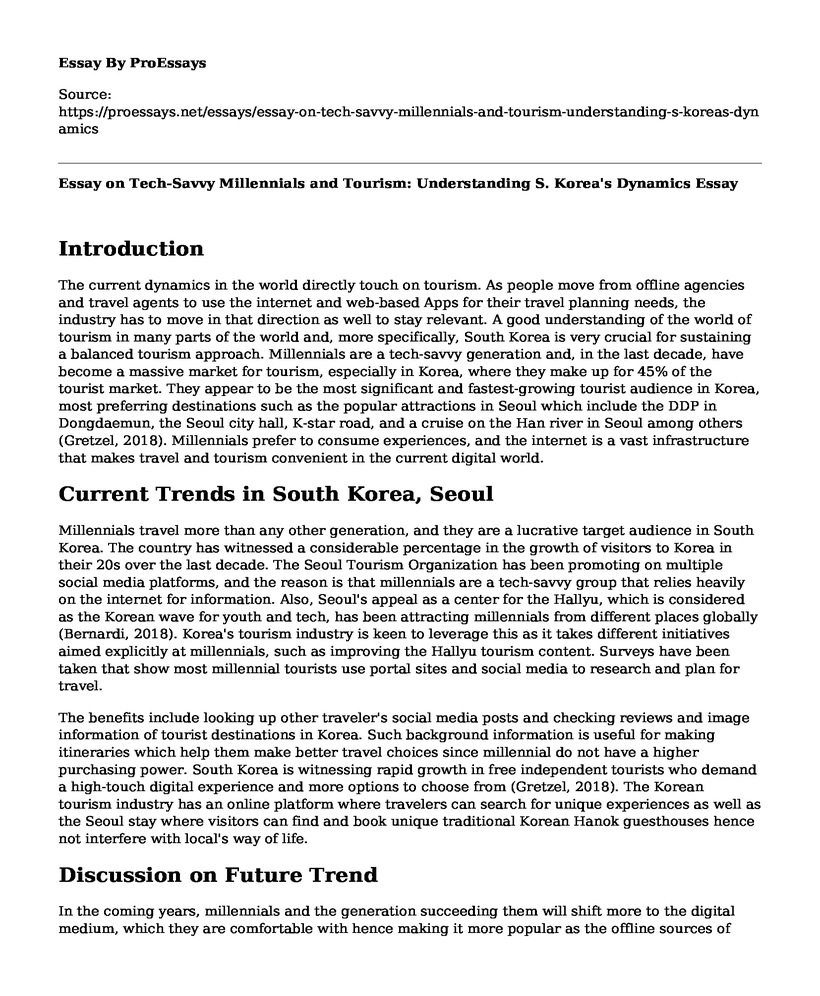Introduction
The current dynamics in the world directly touch on tourism. As people move from offline agencies and travel agents to use the internet and web-based Apps for their travel planning needs, the industry has to move in that direction as well to stay relevant. A good understanding of the world of tourism in many parts of the world and, more specifically, South Korea is very crucial for sustaining a balanced tourism approach. Millennials are a tech-savvy generation and, in the last decade, have become a massive market for tourism, especially in Korea, where they make up for 45% of the tourist market. They appear to be the most significant and fastest-growing tourist audience in Korea, most preferring destinations such as the popular attractions in Seoul which include the DDP in Dongdaemun, the Seoul city hall, K-star road, and a cruise on the Han river in Seoul among others (Gretzel, 2018). Millennials prefer to consume experiences, and the internet is a vast infrastructure that makes travel and tourism convenient in the current digital world.
Current Trends in South Korea, Seoul
Millennials travel more than any other generation, and they are a lucrative target audience in South Korea. The country has witnessed a considerable percentage in the growth of visitors to Korea in their 20s over the last decade. The Seoul Tourism Organization has been promoting on multiple social media platforms, and the reason is that millennials are a tech-savvy group that relies heavily on the internet for information. Also, Seoul's appeal as a center for the Hallyu, which is considered as the Korean wave for youth and tech, has been attracting millennials from different places globally (Bernardi, 2018). Korea's tourism industry is keen to leverage this as it takes different initiatives aimed explicitly at millennials, such as improving the Hallyu tourism content. Surveys have been taken that show most millennial tourists use portal sites and social media to research and plan for travel.
The benefits include looking up other traveler's social media posts and checking reviews and image information of tourist destinations in Korea. Such background information is useful for making itineraries which help them make better travel choices since millennial do not have a higher purchasing power. South Korea is witnessing rapid growth in free independent tourists who demand a high-touch digital experience and more options to choose from (Gretzel, 2018). The Korean tourism industry has an online platform where travelers can search for unique experiences as well as the Seoul stay where visitors can find and book unique traditional Korean Hanok guesthouses hence not interfere with local's way of life.
Discussion on Future Trend
In the coming years, millennials and the generation succeeding them will shift more to the digital medium, which they are comfortable with hence making it more popular as the offline sources of travel information become less used. As tourism and travel information moves into the digital realm, South Korea and the rest of the world will work towards a fair, inclusive, and sustainable tourism industry (Kim, 2016). Urban tourism is becoming more competitive; cities such as Seoul will find ways of limiting consumer-centric tourism and reduce the focus on qualitative growth of the industry. The reason is that to achieve a win-win tourist culture, tourists have to be aware and understand as well as respect the local history, culture, and environment of the locals. It is the only way to ensure inclusive and sustainable tourism that is profitable. Tourism is about being unique and offering experiences that people find worthwhile; this can only be done when the locals are protected. The future of the tourism industry is more inclusive, sensitive to both visitors and local's needs, as well as focused on digital sources of information.
References
Bernardi, M., & Ruspini, E. (2018). 'Sharing Tourism Economy' Among Millennials in South Korea. In Managing Asian Destinations (pp. 177-196). Springer, Singapore.
Gretzel, U., Ham, J., & Koo, C. (2018). Creating the city destination of the future: The case of smart Seoul. In Managing Asian Destinations (pp. 199-214). Springer, Singapore.
Kim, S., & Nam, C. (2016). Hallyu revisited: Challenges and opportunities for South Korean tourism. Asia Pacific Journal of Tourism Research, 21(5), 524-540.
Cite this page
Essay on Tech-Savvy Millennials and Tourism: Understanding S. Korea's Dynamics. (2023, Jul 12). Retrieved from https://proessays.net/essays/essay-on-tech-savvy-millennials-and-tourism-understanding-s-koreas-dynamics
If you are the original author of this essay and no longer wish to have it published on the ProEssays website, please click below to request its removal:
- IFLA Annual Conference in Lisbon and Its Environmental Impact
- Research Paper on Tourism: Role of Food and Wine in Switzerland Tourism
- Western Civilization Transformation Paper Example
- The Implication of the Tsunami on the Tourism Industry of Phuket, Thailand - Research Paper
- Sociology and Planets Future Essay Example
- New Orleans - Essay Sample
- Research Paper on Challenges for Singapore Hospitality Industry: Hotel and Resort Guests Support for Green Initiatives







